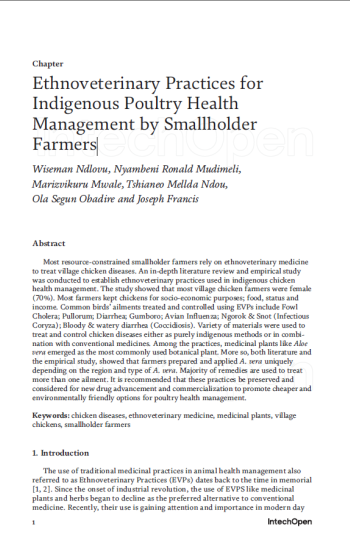
Ethnoveterinary Practices for Indigenous Poultry Health Management by Smallholder Farmers
Most resource-constrained smallholder farmers rely on ethnoveterinary medicine to treat village chicken diseases. An in-depth literature review and empirical study was conducted to establish ethnoveterinary practices used in indigenous chicken
health management. The study showed that most village chicken farmers were female (70%). Most farmers kept chickens for socio-economic purposes; food, status and income. Common birds’ ailments treated and controlled using EVPs include Fowl
Cholera; Pullorum; Diarrhea; Gumboro; Avian Influenza; Ngorok & Snot (Infectious Coryza); Bloody & watery diarrhea (Coccidiosis). Variety of materials were used to treat and control chicken diseases either as purely indigenous methods or in combination with conventional medicines. Among the practices, medicinal plants like Aloe vera emerged as the most commonly used botanical plant. More so, both literature and the empirical study, showed that farmers prepared and applied A. vera uniquely depending on the region and type of A. vera. Majority of remedies are used to treat more than one ailment. It is recommended that these practices be preserved and considered for new drug advancement and commercialization to promote cheaper and environmentally friendly options for poultry health management.
Ndlovu, W., Ronald Mudimeli, N., Mwale, M., Mellda Ndou, T., Segun Obadire, O., & Francis, J. (2023). Ethnoveterinary Practices for Indigenous Poultry Health Management by Smallholder Farmers. IntechOpen. doi: 10.5772/intechopen.108912
-

-
Joseph Francis
-
Marizvikuru Mwale
-
Nyambeni Ronald Mudimeli
-
Ola Segun Obadire
-
Tshianeo Mellda Ndou
We support the free flow of information. Please share:
More content
-

What Foot and Mouth Disease-free means for South Africa’s game meat trade
Ms Lydia Daring Bhebe…Explore the latest developments in South African provinces achieving and maintaining Foot and Mouth Disease (FMD) free status…
Articles -

The world wildlife trade regulator is 50 – here’s what has worked and what needs to change
Daniel Challender…Most countries implement Cites, the Convention on International Trade in Endangered Species of Wild Fauna and Flora as…Articles -

Enabling Sustainable Wildlife Trade
Prof Francis VorhiesEnabling sustainable wildlife trade is a key policy measure for growing Africa's wildlife economy. In this respect, CITES…
Articles -

Has CITES become too complicated to be effective?
Prof Francis VorhiesGovernments agreed to the text of CITES in the 1970s, which is quite straightforward. However, the agreement’s implementation…
Articles -

From poachers to providers: Can Africa's wild meat market save wildlife?
Dr Wiseman NdlovuHave you ever considered how wild meat could be more than just a cultural staple but also a…
Articles -

As a fellow of the African Wildlife Economy Institute (AWEI), I am excited to attend the upcoming 3rd…
Articles -

A theory of change to improve conservation outcomes through CITES
Dr Michael 't Sas-Rolfes…Here we articulate the implied theory of change (ToC) underpinning the design and operation of CITES (Convention on...
2025Research -

Wild Meat Value Chain Integration Systems: Opportunities for Value Chain Formalisation and Scaling in Africa
Dr Wiseman Ndlovu…Establishing a legal, safe and sustainable wild meat sector promises to potentially reduce demand for illegally sourced meat...
2025Research -

AWEI's 2024 Wildlife Economy Dialogue Series
Ms Emily TaylorRediscover 2024: A year of insight and inspiration
In 2024, AWEI proudly hosted three ground-breaking dialogue series in…
Articles
Get updates by email
Through impactful research, stakeholder engagement, and professional development, AWEI is supporting the wildlife economy across Africa. Please subscribe for occasional updates on our work and forthcoming events.
Sign up for a quarterly dose of AWEI insights
In a complex and changing world, AWEI generates strategic ideas, conducts independent analysis on wildlife economies, and collaborates with global scholar-practitioners to provide training and expertise for biodiversity conservation, climate resilience, and inclusive economic opportunities in Africa.
